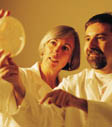 An
affinity for eggs As it happens, the chicken has been intriguing humans since Aristotle. "The chicken is a well-studied model for vertebrate development and an important biomedical model," said Delany. "The same events and processes occur in humans, mice and chickens, but the advantage to studying chickens is that these events and processes happen inside the egg so there's no maternal environment to deal with." Delany's research career began when as a college student she participated in a summer program at the prestigious Jackson Laboratory at Bar Harbor, Maine. After receiving a degree in biology, she moved on to earn both M.S. and Ph.D. degrees in animal genetics at Cornell University. Since coming to Davis in 1995, her interest in tumor genetics has led her to search for so-called "background" genes that may promote oncogenesis, specifically those that contribute to the promotion of metastases. Tumor genetics is the focus of that part of her work funded by her cancer society grant. Working with two groups of congenic chickens, so called because 99.9 percent of their genome is identical, Delany has studied the gene complexes on the one chromosome that differs between the lines to see if it is involved in promoting tumor growth and metastases formation. "Both congenic lines develop primary wing-web tumors when injected with the Rous sarcoma virus oncogene," she said. "How- ever one line is resistant and regresses the primary tumor, while the other genetic line of susceptible birds does not exhibit primary tumor regression and usually forms a fatal metastases in the liver or lung. That gives us a neat model to study." Photo right: Mary Delaney's grant from the American Cancer Society has fueled her investigation of cell development in chick embryos.
Home |
Table of Contents |
To our Readers |
Building on Basics UC Davis Health System | © 2000, 2001, 2002 UC Regents. All rights reserved. |
  |
